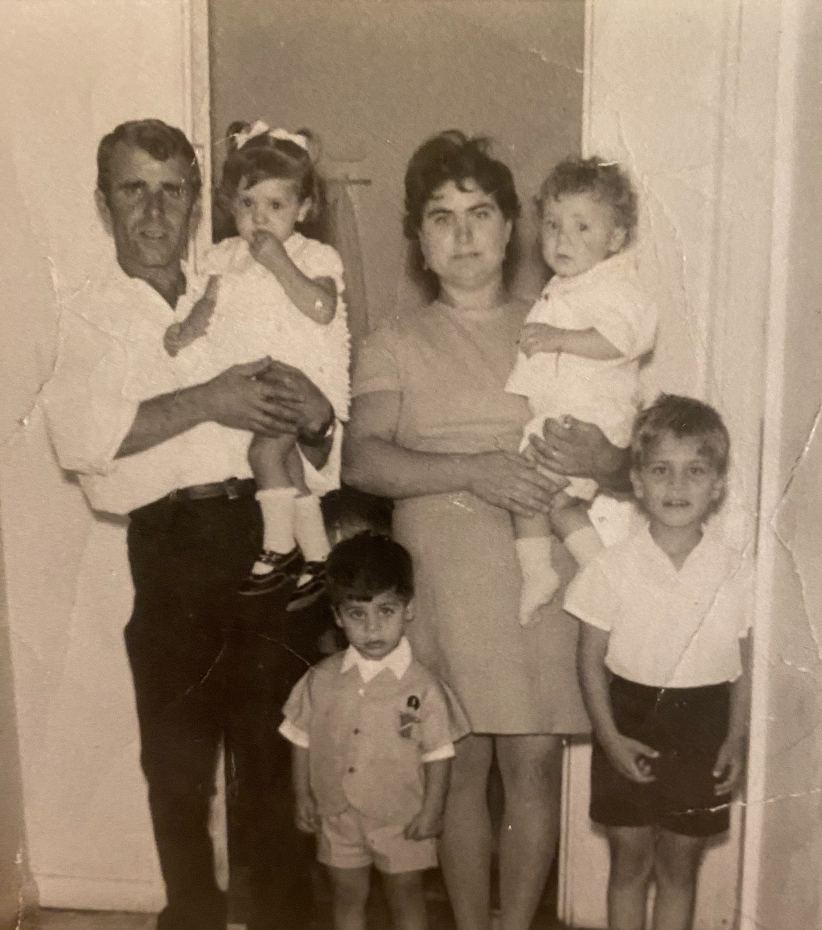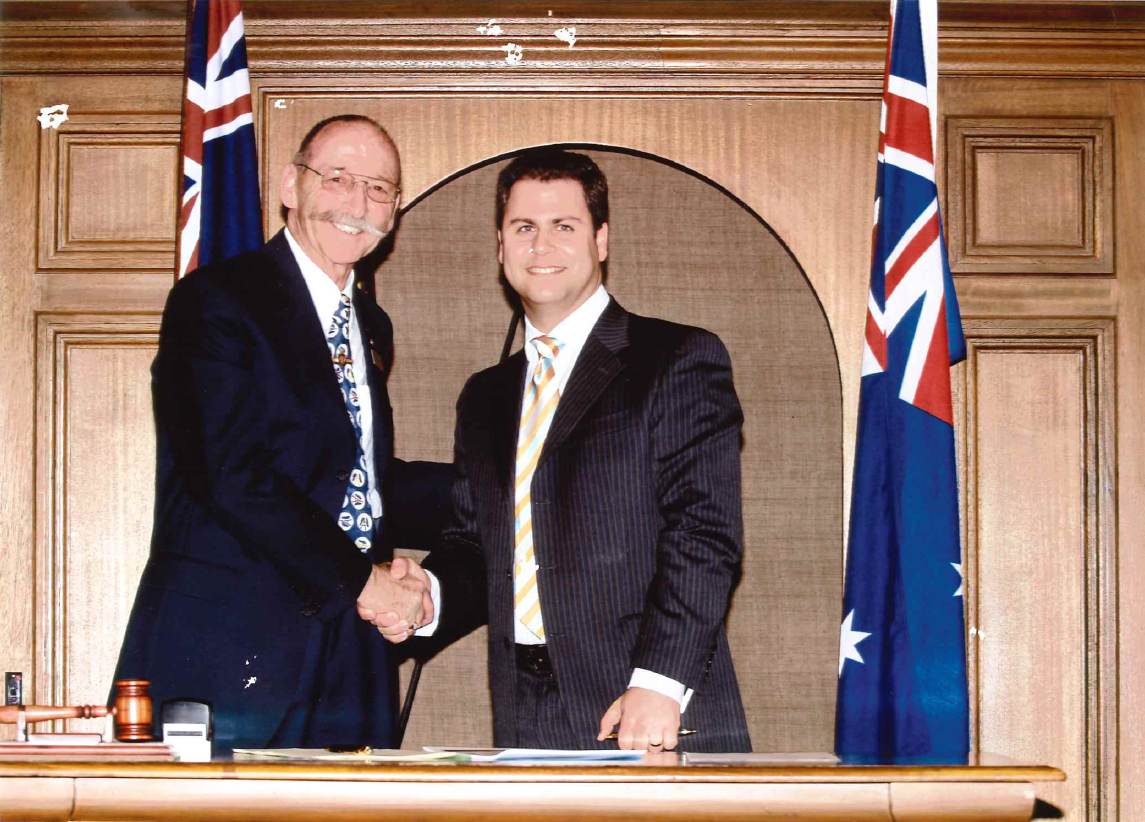Robert Bria’s one regret after two decades as an eastern suburbs Mayor
Robert Bria has been sitting on the Norwood, Payneham and St Peters Council ever since it was formed in the ‘90s. Today, he celebrates 20 years as Mayor. InDaily asks about the highs and lows – learning of his one regret.

A self-described “outsider” and Year 12 flunk has gone on to be a permanent fixture at Norwood Town Hall, and today celebrates two decades as the mayor of an inner eastern suburbs council.
Robert Bria is the longest-serving Mayor of Norwood, Payneham and St Peters – established in 1997 – and the only member of council to have been there since the city’s very inception.
Now 56 years old, Bria has been on the council for half of his life.
Ardently a family man, he humbly ascribes his passion for serving the community to his mother, and has no plans to hang up the boots just yet on a long-term career in local government.
“Every day is a privilege, being in this role,” he told InDaily in a sit-down interview at Norwood Town Hall.
“I wouldn’t want to be mayor of any other council, because I’ve lived here all my life. I know the people. There’s a connection here for me. This is visceral.
“It’s not transactional. I’m not here for applause, I’m here for a cause. And I mean that sincerely.”
Dunstan MP Cressida O’Hanlon hosted Bria and his family at Parliament House for lunch yesterday to celebrate his two decades as Mayor, and honoured his milestone in a Lower House speech.
Bria was born on September 20, 1969, to Italian immigrants who arrived in Australia earlier that decade.
His father, Rocco (who recently turned 90), lived on Cairns Road – just off The Parade – on his arrival in Adelaide. His late mother, Rosina, arrived three years later at just 24 years of age on New Year’s Day.
“My mother’s probably the most courageous woman I’ve ever known,” Bria said.
“For someone so young to go through that and come to a country halfway across the world, not able to speak the language, not understanding the culture… she was on her own on the ship… that would’ve been pretty horrific for a young woman in those days to go through all of that.”
This courage rubbed off on Bria, who said his service to the community was “in some ways a vicarious repayment of the debt that my family owes to Australia”.
“For giving my parents the opportunity to come out of the long shadows of poverty and into the bright sunshine of prosperity, as Australia did for millions of other post-War European migrants”.
From high school flunk to councillor
Bria went to school in the area, first to East Marden Primary School and then to Thorndon High School (now called Charles Campbell High School).
You might like
He was an “average student”. Social life and football were his priorities, and he played for Payneham, whereas the rest of his peers played for Athlestone.
As such, he felt like an “outsider” and “not one of the cool kids”. This built resilience in young Bria, he said.
“I wasn’t bullied but did experience racism on a fairly regular basis,” he said.
“Me and all the other Italian and Greek kids… we were known as the wog squad, so you had to deal with that.
“But I think, in many ways, high school gave me that resilience.”

At the finish line, Bria failed Year 12 by a hair. He was initially shocked: “and the shock turned to disappointment”.
“And then the disappointment turned to embarrassment and the embarrassment turned to shame,” he said.
That shame hung around for about eight years, he said: “It just nagged at me”.
“I felt like a failure,” he said. “I developed a bit of a complex about it, to be honest.”
The next six or seven years were “a bit of a drift”, he said. He did some odd jobs and eventually went to Marden Senior College to repeat Year 12 in 1994. After graduating, he went onto university and completed an Honors in a Bachelor of Arts at Flinders.
Joining the Council
It was around this time that the state government was looking at amalgamating suburban councils. Kensington and Norwood, St Peters and the Garden City of Payneham merged in 1997.
“At the time I thought, well, this sounds pretty exciting,” Bria said.
“I’d always had an interest in politics, and thought being a part of a brand new city would be pretty fun.”
He thew his hat in the ring for the election – the last where voters actually had to go to the ballot.
“I experienced racism during that campaign, which in some respects didn’t surprise me but disappointed me nevertheless,” he said.
He was elected as a councillor representing Torrens Ward, which took in the suburb of Felixstow, where Bria was living at the time. He was sworn in on November 10, 1997.

Bria was just 28 years old at the time – the youngest person on the council – and was one of four who had notserved on any of the pre-merger councils. Now, he’s the only one from that initial group who remains in Town Hall.
“That early term was a rollercoaster, especially with the brand-new council. You had people coming from three different council areas with baggage,” he said.
“Those meetings had it all. Very late, often beyond midnight, when we’re just exhausted beyond being able to think straight. The only thing missing was popcorn.
“I came in with a bit of knowledge about politics and thought I would handle myself, but it was clear to me eventually that I knew three-fifths of bugger all.”
Since then, he has won nine elections – six as Mayor – married his wife Pina and had three children, Isabell, Christian and Charlotte. None of them know Bria as anything other than Mayor, as he had his first – Isabell – in December 2005.
“I’ve worked hard for them, but every day is a privilege,” he said.
Twenty years as Mayor
Stay informed, daily
Bria is the second-ever Mayor of Norwood, Payneham and St Peters. The first was Mayor Laurie Fioravanti, who died in June 2005.
On Fiorvanti’s death, Bria became acting Mayor as he was already serving as Deputy Mayor at the time. Four months later, he won the mayoral by-election, securing 64 per cent of the vote in a two-man race.
“I think I felt pretty confident that I could do the job because I’d already served two terms – eight years – as a councillor,” he said.
“I’d served my apprenticeship. Those first three years of council, which were hard, gave me a real grounding.”
The first real test was not 12 months later when he ran again for Mayor and won unopposed, but in 2010 – his second proper campaign.
That year he had two opponents: former SA legislative councillor David Winderlich and former St Peters mayor Patricia Huish. The campaign was “gruelling”, he said.
“They preferenced each other against me,” he said.
“But you know, I got over the line again.
“Every election is hard but that one sticks in my mind.”
His most satisfying win was in 2022, he said, when he was up against two female opponents: Cue Bar owner Tracy Marsh and long-term resident Sue Litchfield.
Bria said that campaign one candidate “decided to play the gender card, which I thought was disappointing”.
“I just thought it was unnecessary,” he said.
“You expect that sort of stuff at state and federal level, but I like to think that at a local government level you’re a bit cleaner than that.
“It was a very satisfying win. If there had been a different person as Mayor, the council would have taken a very different trajectory and, in my view, not for the better.”
He said each election is a “brutal job interview, and I’ve passed six times”.
“It gets harder because the job has become harder and expectations have become higher,” he said.
“You’re being asked to do more with less in terms of budget and in my role the expectations of me and my time have just gone through the roof.
“Behind the Adelaide City Council, this council is probably the most high-profile in the state, so there’s that high level of visibility and I’ve always been attuned to that. People are always watching.
“I’m not here for my legacy. In years to come, people won’t remember my name and nor should they. But if they can think back and say ‘well the council of 2025 did a great thing in this or that’ then that’s the thanks I need.”
In addition to being Mayor, he’s also worked full-time with Multicultural Affairs, including a two-year secondment to SA Health working in the State Control Centre during the COVID-19 pandemic where he was the sole Multicultural Liaison Officer working with SA’s cultural communities.
He also served as a Member of the St Joseph’s Memorial School Board for six years and coached his son’s football team at the school for three seasons. He also has participated in almost every Norwood Christmas Pageant during his 28 years on council.
Bria also completed a postgraduate management degree in 2014.
He is currently the Deputy Chair of Mainstreet SA and a member of Economic Development Australia.
Achievements and regrets
In his time as Mayor, Bria’s council area has transformed – quite visibly if you look at the rising apartments being constructed along The Parade and its surrounds.
The area is also consistently ranked the lowest-risk region in the country to do business per CreditorWatch.
But his proudest achievement was the creation of a little-known, but big-hearted, program to support young people: The Young Achievers Grants Program.
It was a program he initiated in 2005, and it provides grants to young people who’ve been selected to represent South Australia in sport or another activity. Since its inception, 135 young people have been assisted via the program.
“Knowing how many young people have been helped along the way to get them on that bus trip interstate, to get them on that aeroplane, to pay for their board or lodging… that is very satisfying to me,” he said.
Bria’s mother died four years ago, and would have turned 87 yesterday on October 16.
“The one regret I do have is a personal regret,” he said, through tears.
“She would be turning 87 on the day before I hit 20 years. The fact that she’s not here, that is hard.
“I think she’d be proud.”









